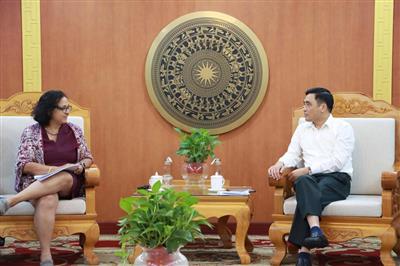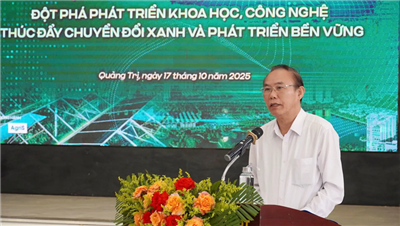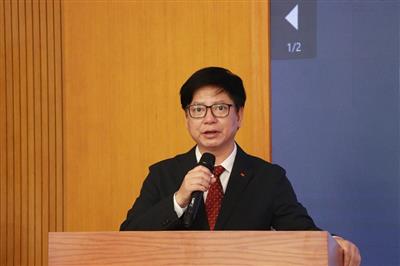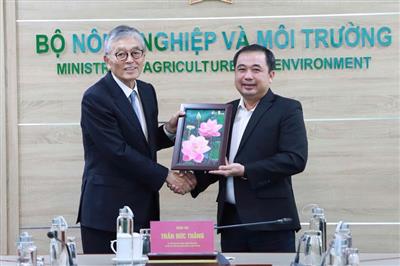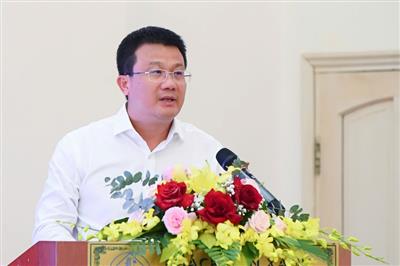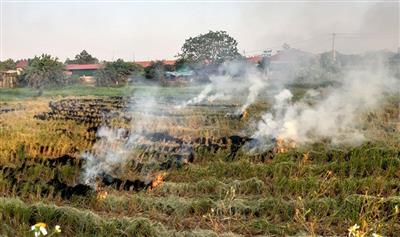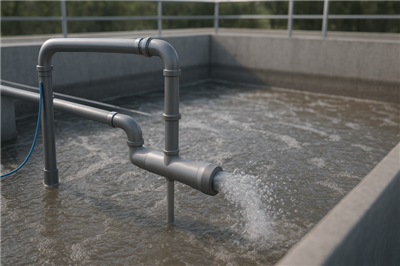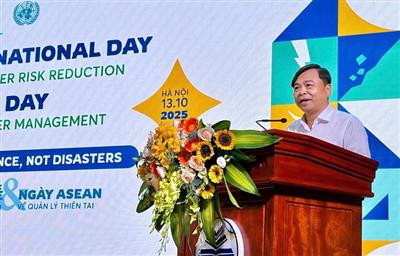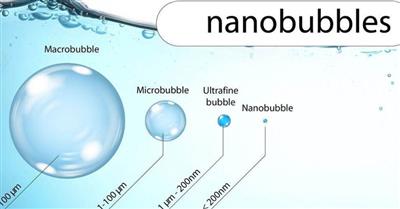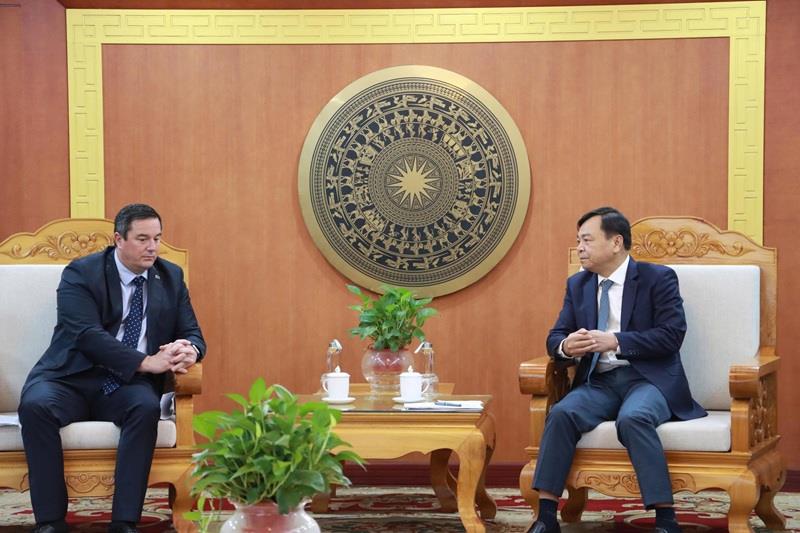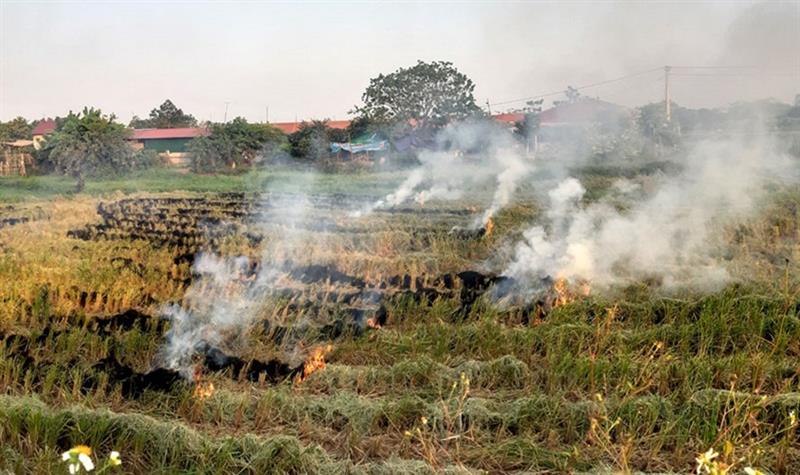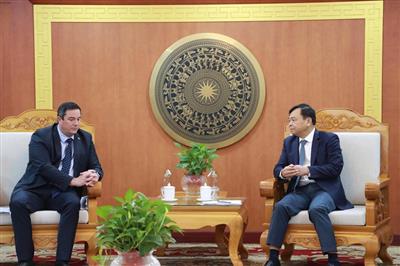
Vietnam proposes 7 marine conservation measures at APEC ocean ministerial meeting
05/05/2025TN&MTA Vietnamese delegation, led by Deputy Minister of Agriculture and Environment Phung Duc Tien, held a working session with South Korea’s Ministry of Oceans and Fisheries and attended the 5th APEC ocean ministerial meeting (AOMM5) in Busan, South Korea on May 1.
Vietnam ready to share models for green and sustainable economic development
Speaking at AOMM5, Deputy Minister Phung Duc Tien emphasized that amid climate change, environmental pollution, and overexploitation, strengthening ocean resilience and conserving the marine environment are critical tasks for all economies in pursuit of sustainable economic growth.
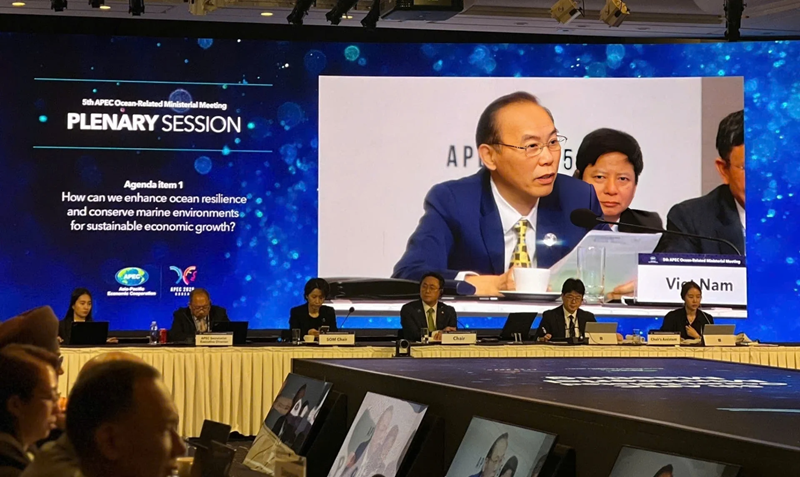
Deputy Minister Phung Duc Tien (top row, second from the right) leads the Ministry of Agriculture and Environment delegation at the AOMM5
Vietnam outlined seven concrete actions to enhance ocean conservation and promote sustainable marine development.
First, the country is developing a national master plan for the conservation of aquatic resources, as mandated by the Prime Minister. This strategic framework aims to guide long-term efforts in preserving marine biodiversity.
Second, Vietnam is establishing 20 marine protected areas and exploring other effective area-based conservation measures (OECMs) to restore ecosystems and safeguard biodiversity across its coastal and marine zones.
Third, the government is promoting sustainable livelihoods for coastal communities by encouraging a shift from traditional fishing practices to environmentally responsible aquaculture.
Fourth, Vietnam is fostering public-private partnerships (PPPs) and implementing co-management models to ensure active participation from all relevant stakeholders in marine conservation efforts.
Fifth, the country is applying circular economy principles to both marine and integrated aquaculture systems. This approach emphasizes ecosystem-based, multi-value methods that are both environmentally sustainable and economically viable.
Sixth, Vietnam is rolling out programs to reduce marine plastic pollution through community-led initiatives such as waste collection, sorting, and exchange. It is also working to improve wastewater treatment and environmental monitoring at aquaculture sites and fishing ports.
Finally, the country is strengthening regional and international cooperation to enhance the resilience of the oceans and protect the marine environment in the face of growing global challenges.
On combating illegal, unreported, and unregulated (IUU) fishing, Deputy Minister Phung Duc Tien affirmed that Vietnam is enhancing its legal framework and surveillance mechanisms by implementing a vessel monitoring system (VMS), ensuring traceability of seafood products, strictly penalizing violations, and supporting fishers in complying with regulations.
Vietnam is also expanding international cooperation to share data, harmonize fisheries laws, transition to sustainable marine aquaculture, facilitate the legal operation of vessels in international waters, and fulfill global commitments to ocean protection, environmental conservation, and sustainable fisheries.
Deputy Minister Phung Duc Tien also highlighted the importance of fair and inclusive economic empowerment in the ocean and fisheries sectors, with a particular focus on women and coastal communities. Vietnam is working to improve access to capital, natural resources, knowledge, and technology for vulnerable groups, while elevating women’s roles in policymaking and across the fisheries value chain—from harvesting and farming to processing and marketing.
He encouraged the development of transparent, effective PPP models and support for professional and co-management organizations to ensure shared benefits for all stakeholders.
Vietnam, he reiterated, is ready to share its practical models and seeks closer cooperation with APEC economies toward a prosperous, inclusive, and sustainable blue economy.
Balancing development with responsible exploitation
At the APEC meeting on April 30, Deputy Minister Phung Duc Tien noted that Vietnam’s fisheries sector is facing significant challenges, including the impacts of climate change and environmental degradation.
Vietnam has enacted the 2017 Fisheries Law, as well as national strategies and programs on aquaculture, fisheries management, and marine debris reduction.

Deputy Minister Phung Duc Tien affirms that Vietnam is ready to share practical models and looks forward to close cooperation with APEC economies
The country is actively cooperating with FAO, ASEAN, and international organizations on initiatives to protect coastal ecosystems, conserve biodiversity, manage ocean plastic waste, strengthen community resilience, and promote smart, sustainable models in fisheries and marine management.
Vietnam is also participating in mechanisms to share information on IUU fishing, support the safety of fishers, and ensure compliance with sustainable management practices.
However, Deputy Minister Phung Duc Tien cautioned that individual efforts by APEC economies are insufficient to achieve a sustainable and prosperous ocean.
"Vietnam strongly supports enhanced cooperation and coordination among economies through dialogue and information sharing to develop a holistic, multi-sectoral approach to the blue economy," Deputy Minister Phung Duc Tien said. "This must strike a balance between economic development and responsible resource management, sustainable aquaculture and fisheries, environmental protection, and secure livelihoods for coastal communities." He emphasized that the ocean plays a vital socio-economic role not only for Vietnam but for all APEC member economies.
During the APEC mission, the Vietnamese delegation also visited the National Institute of Fisheries Science (NIFS). Both sides agreed to strengthen cooperation in aquaculture research and experience sharing. Deputy Minister Phung Duc Tien proposed that South Korea continue supporting technical ODA projects to enhance the capacity of Vietnam’s fisheries sector.
Linh Linh


